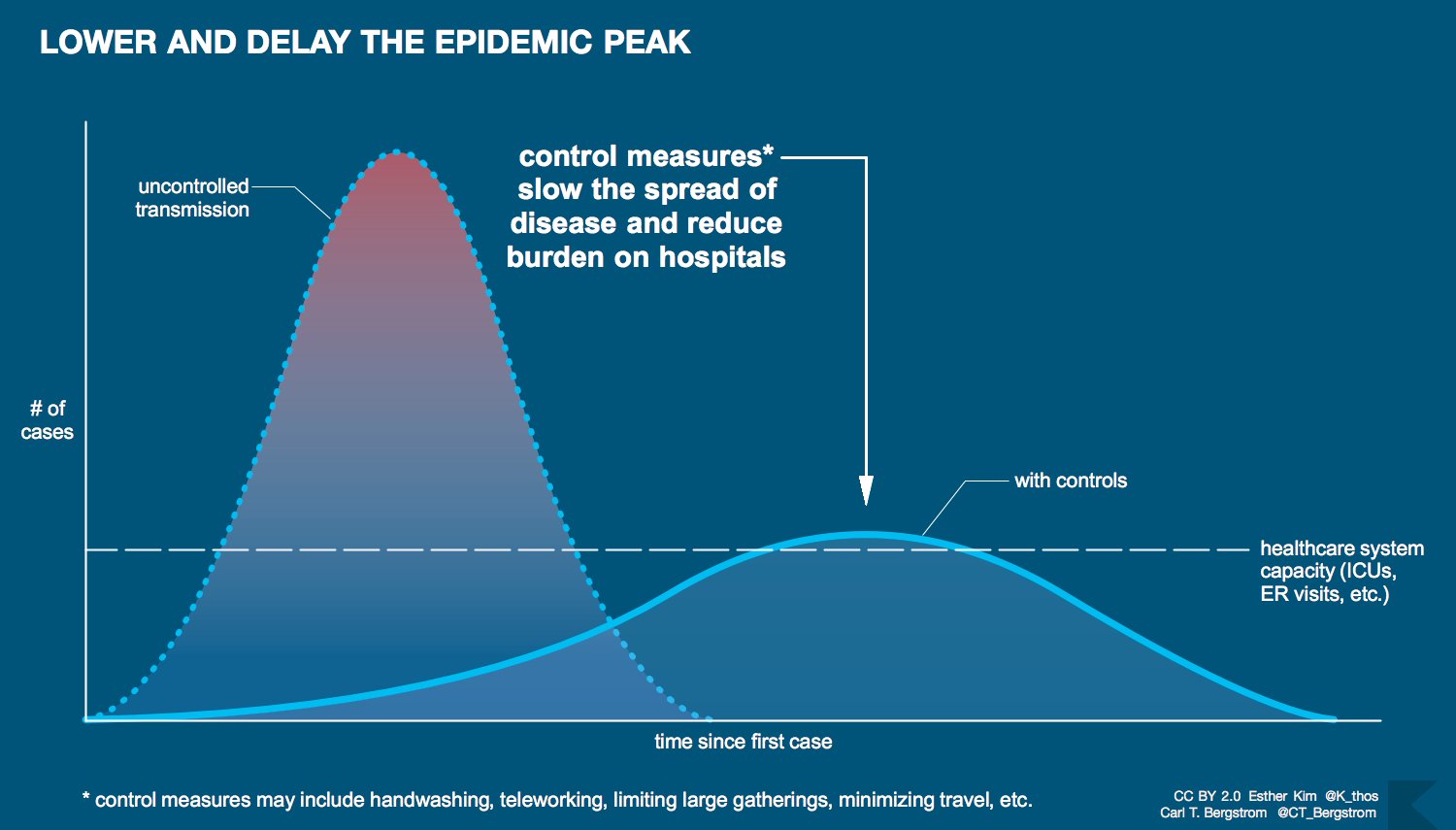Apartment business as (un)usual
That happened fast. Business as usual got turned on its head and now we find ourselves in this new, yet hopefully temporary, normal that will surely yield a new normal.
As of April 6, 2020, 45 of 50 states have total or partial Stay-at-Home orders in place (stay updated here) as part of the effort to flatten the COVID-19 infection curve. This means that about 90% of the US population has been ordered to stay at home.

The depiction of the flattened curve, as shown above drives home the point that we can lessen the peak impact but, in doing so, we create an elongated tail, which will make getting back to business as usual an ongoing challenge.
In a recent post, I wrote that “The various applications of technology that we are suddenly using were not just invented. Instead, we have been slowly adopting them on our own terms, as our budgets would allow and where markets demanded. Now, suddenly, we are all in the deep end together, figuring it out and making it work, accelerating adoption.”
Accelerated adoption of digital services
Let’s dig in on the idea of accelerated adoption and highlight the technologies that, if you’re not already using them, should be explored to keep your operations digitally enabled. Evaluating and deploying these technologies as soon as possible will improve operational continuity in the short term while laying the foundation for a new normal down the road that will provide better service for prospects and residents and also drive greater staff efficiency.
Enabling socially distant business practices
Social distancing is the driver for process change, for accelerated technology adoption, and ultimately, more efficient properties. Let’s start with resident-centric processes and how technology can be used to simplify things for residents.
With social distancing, self-service is becoming the only service, and it is delivered via a resident portal. Resident portals have many features, which can be placed into two categories: features that provide self-service extensions of transactions and features that foster community and communication. With the current need for business continuity and technology adoption, let’s focus on two of the most prevalent self-service extensions: electronic payments and electronic service requests.
Collecting rent is a critical practice for ongoing operations. Many properties no longer accept cash. More and more are getting away from checks. Now is the time to convert your residents to electronic payments as the only payment method accepted, with options for ACH, debit card or credit card. Recurring payments can also be set up for ongoing resident convenience. Fully electronic payment processes provide a level of accuracy and security that will drive ongoing efficiency. They are also what more and more residents have come to expect.
Given current conditions, typical policies that only accept full payment and put constraints on credit card usage should be controllable by property management to better service their resident.
Service request submittal from a portal allows for collection of specific pieces of information (pending permission) and gets a request into the queue immediately, as opposed to it being noted by staff and entered at the end of the day. Residents will get a better response and staff will have less administrative work to do when service requests originate from the portal.
In addition to the frequent actions of payments and service requests, there should also be the ability to process renewals online. This allows residents to accept and execute a renewal offer without having to meet in person. This capability can extend though the digital execution of the paperwork, leveraging digital documents and signatures.
For MRI Software clients, we cover these needs with our Resident Connect, MRI Payments and Online Renewal products.
The lead to lease processes
The current environment for leasing has changed drastically. Leasing offices have quickly moved to appointment only or have closed. Virtual and self-guided tours continue to gain traction. Traffic patterns and volumes are changing, no clear patterns have emerged, and the duration of this crisis is unknown. As a result, the summer leasing season is sure to get off to a slow start. While technology will not solve the traffic volume problem, it can provide many useful tools for business continuity as you seek to attract and retain great residents.
In a time of reduced traffic, every lead matters. You must engage quickly, consistently and professionally, independent of how well your leasing function is operating. You should be using lead management software to ensure consistent tracking and full visibility of all leads. Keeping leads in a system of record will also allow for necessary reporting and analysis of traffic patterns, lead sources and agent performance so that operational practices can be tuned to the current situation.
With leasing offices having moved to an appointment-based model, providing prospects a method to self-schedule appointments is critical. Offering a self-service capability to schedule tours takes that work off the staff and allows the prospect to do it at their leisure. It will also place those appointments directly into the lead management system.
Leveraging a consistent set of content will allow you to inject new virtual tours and other digital media into the prospects’ leasing experience.
Once they are set to apply, online leasing tools become the next requirement for business continuity. Prospects should be able to fully complete their lease application online. They should be able to include roommates and guarantors as well as pets. They should be able to provide a form of payment for application processing. The process should be completed via the digital execution of the lease document and necessary addenda. Screening processes, behind the scenes from an applicant point of view, will continue to abide by scoring mechanisms as defined for the specific property.
For MRI Software clients, we cover these needs with our Prospect Connect, MRI Payments, Resident Screening and MRI Secure Sign products.
The current crisis has caused substantial change quickly. It has driven rapid adoption of technology and created opportunities to embrace it even more. In this moment, the multifamily industry can effect permanent change that will enhance customer service and make property operations strong and more efficient when things return to the new normal – what we will come to know as business as usual.
Make Smarter Decisions with AI-Powered Business Intelligence
Explore how Business Intelligence (BI) and data management can revolutionize decision-making in the real estate industry. This webinar features industry experts, including Andy Birch, VP at MRI Software, Justin Manning, Senior Specialist at Microsoft…
